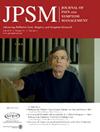虚拟现实旅行对血液透析患者症状负担及心理健康的益处
IF 3.2
2区 医学
Q2 CLINICAL NEUROLOGY
引用次数: 0
摘要
背景:。血液透析(HD)患者往往面临着沉重的症状负担,低主观幸福感和高感知压力。传统的非药物干预措施在改善这种情况方面效果有限。虚拟现实(VR)技术作为一种新兴技术,在减轻症状负担、促进心理健康方面具有显著优势。目的:。评估HD患者单次VR旅行的可行性,并研究其对症状负担、主观幸福感和感知压力的影响。方法:。本研究采用嵌入式设计,通过VR头戴式显示器(HMD)提供约10分钟的自然VR旅行体验。评估了HD患者单次VR旅行的有效性。定量数据通过自我报告调查收集,使用透析频率严重程度和症状负担指数(DFSSBI)评估症状负担,一般幸福感量表(GWBS)和感知压力量表(PSS)评估幸福感和压力。干预后,修改单项目问卷评估患者对VR旅行体验的满意度。其中包括一个开放式问题,以获取患者的体验反馈。结果:。20例HD患者,平均年龄41.3(9.82)岁,完成了VR旅行和后续评估。该队列由35%的女性和65%的男性参与者组成。虚拟现实旅游大大改善了症状负担(t = 3.642,P = 0.002),提高主观幸福感(t = -6.119,P < 0.001),并降低感知压力(t = 4.155,P = 0.001)。干预后满意度得分为7.35分(1.35分),满分为10分,参与者对他们的VR旅行体验提供了积极的反馈。结论:。单次VR旅行可以减轻HD患者的症状负担,增强主观幸福感,减少感知压力。参与者报告了高满意度和积极的情绪反应,这表明这种体验可以作为一种非药物干预措施纳入护理常规,以改善HD患者的症状负担和心理健康。本文章由计算机程序翻译,如有差异,请以英文原文为准。
The Benefits of Virtual Reality Travel on Symptom Burden and Mental Health of Hemodialysis Patients
Context
Hemodialysis (HD) patients often face a heavy symptom burden, low subjective well-being, and high perceived stress. Traditional nonpharmacological interventions have limited effectiveness in improving this situation. Virtual reality (VR) technology, as an emerging approach, has shown significant advantages in alleviating symptom burden and enhancing mental health.
Objective
To assess the feasibility of a single VR travel session for HD patients and to examine its impact on symptom burden, subjective well-being, and perceived stress.
Methods
This study adopted an embedded design, providing approximately 10 minutes of natural VR travel experience using VR head-mounted displays (HMD). The effectiveness of a single VR travel session for HD patients was evaluated. Quantitative data were collected through self-reported surveys using the Dialysis Frequency Severity and Symptom Burden Index (DFSSBI) to assess symptom burden, the General Well-Being Schedule (GWBS), and the Perceived Stress Scale (PSS) to evaluate well-being and stress. Postintervention, a modified single-item questionnaire assessed patient satisfaction with the VR travel experience. An open-ended question was included to capture patients’ experiential feedback.
Results
Twenty HD patients, with a mean age of 41.30 (9.82) years, completed the VR travel and subsequent assessments. The cohort comprised 35% female and 65% male participants. The VR travel significantly improved symptom burden (t = 3.64, P = 0.002), increased subjective well-being (t = -6.12, P < 0.001), and reduced perceived stress (t = 4.16, P = 0.001). The postintervention satisfaction score was 7.35 (1.35) out of 10, and participants provided positive feedback on their VR travel experience.
Conclusion
A single VR travel session can alleviate symptom burden, enhance subjective well-being, and reduce perceived stress in HD patients. Participants reported high satisfaction and positive emotional responses, suggesting that this experience could be integrated into care routines as a nonpharmacological intervention to improve symptom burden and mental health in HD patients.
Clinical Trial Registration
[www.chictr.org.cn], identifier [ChiCTR2400082781].
求助全文
通过发布文献求助,成功后即可免费获取论文全文。
去求助
来源期刊
CiteScore
8.90
自引率
6.40%
发文量
821
审稿时长
26 days
期刊介绍:
The Journal of Pain and Symptom Management is an internationally respected, peer-reviewed journal and serves an interdisciplinary audience of professionals by providing a forum for the publication of the latest clinical research and best practices related to the relief of illness burden among patients afflicted with serious or life-threatening illness.

 求助内容:
求助内容: 应助结果提醒方式:
应助结果提醒方式:


